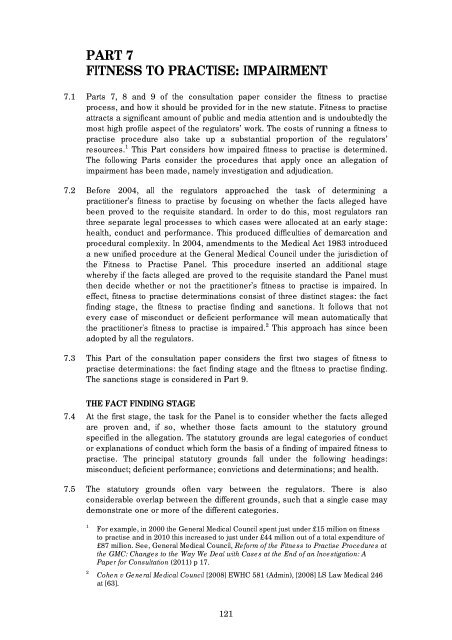Regulation of Health and Social Care Professionals Consultation
Regulation of Health and Social Care Professionals Consultation
Regulation of Health and Social Care Professionals Consultation
Create successful ePaper yourself
Turn your PDF publications into a flip-book with our unique Google optimized e-Paper software.
PART 7<br />
FITNESS TO PRACTISE: IMPAIRMENT<br />
7.1 Parts 7, 8 <strong>and</strong> 9 <strong>of</strong> the consultation paper consider the fitness to practise<br />
process, <strong>and</strong> how it should be provided for in the new statute. Fitness to practise<br />
attracts a significant amount <strong>of</strong> public <strong>and</strong> media attention <strong>and</strong> is undoubtedly the<br />
most high pr<strong>of</strong>ile aspect <strong>of</strong> the regulators’ work. The costs <strong>of</strong> running a fitness to<br />
practise procedure also take up a substantial proportion <strong>of</strong> the regulators’<br />
resources. 1 This Part considers how impaired fitness to practise is determined.<br />
The following Parts consider the procedures that apply once an allegation <strong>of</strong><br />
impairment has been made, namely investigation <strong>and</strong> adjudication.<br />
7.2 Before 2004, all the regulators approached the task <strong>of</strong> determining a<br />
practitioner’s fitness to practise by focusing on whether the facts alleged have<br />
been proved to the requisite st<strong>and</strong>ard. In order to do this, most regulators ran<br />
three separate legal processes to which cases were allocated at an early stage:<br />
health, conduct <strong>and</strong> performance. This produced difficulties <strong>of</strong> demarcation <strong>and</strong><br />
procedural complexity. In 2004, amendments to the Medical Act 1983 introduced<br />
a new unified procedure at the General Medical Council under the jurisdiction <strong>of</strong><br />
the Fitness to Practise Panel. This procedure inserted an additional stage<br />
whereby if the facts alleged are proved to the requisite st<strong>and</strong>ard the Panel must<br />
then decide whether or not the practitioner’s fitness to practise is impaired. In<br />
effect, fitness to practise determinations consist <strong>of</strong> three distinct stages: the fact<br />
finding stage, the fitness to practise finding <strong>and</strong> sanctions. It follows that not<br />
every case <strong>of</strong> misconduct or deficient performance will mean automatically that<br />
the practitioner's fitness to practise is impaired. 2 This approach has since been<br />
adopted by all the regulators.<br />
7.3 This Part <strong>of</strong> the consultation paper considers the first two stages <strong>of</strong> fitness to<br />
practise determinations: the fact finding stage <strong>and</strong> the fitness to practise finding.<br />
The sanctions stage is considered in Part 9.<br />
THE FACT FINDING STAGE<br />
7.4 At the first stage, the task for the Panel is to consider whether the facts alleged<br />
are proven <strong>and</strong>, if so, whether those facts amount to the statutory ground<br />
specified in the allegation. The statutory grounds are legal categories <strong>of</strong> conduct<br />
or explanations <strong>of</strong> conduct which form the basis <strong>of</strong> a finding <strong>of</strong> impaired fitness to<br />
practise. The principal statutory grounds fall under the following headings:<br />
misconduct; deficient performance; convictions <strong>and</strong> determinations; <strong>and</strong> health.<br />
7.5 The statutory grounds <strong>of</strong>ten vary between the regulators. There is also<br />
considerable overlap between the different grounds, such that a single case may<br />
demonstrate one or more <strong>of</strong> the different categories.<br />
1 For example, in 2000 the General Medical Council spent just under £15 million on fitness<br />
to practise <strong>and</strong> in 2010 this increased to just under £44 million out <strong>of</strong> a total expenditure <strong>of</strong><br />
£87 million. See, General Medical Council, Reform <strong>of</strong> the Fitness to Practise Procedures at<br />
the GMC: Changes to the Way We Deal with Cases at the End <strong>of</strong> an Investigation: A<br />
Paper for <strong>Consultation</strong> (2011) p 17.<br />
2<br />
Cohen v General Medical Council [2008] EWHC 581 (Admin), [2008] LS Law Medical 246<br />
at [63].<br />
121
















